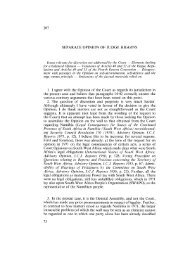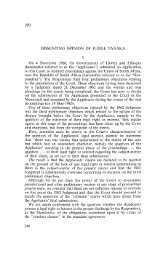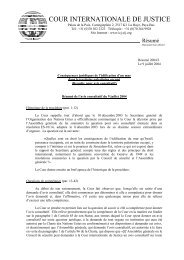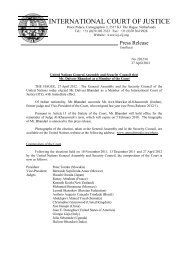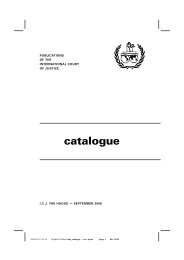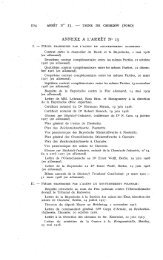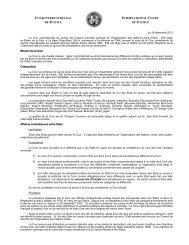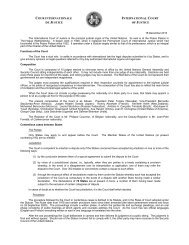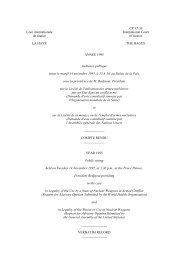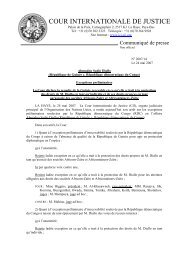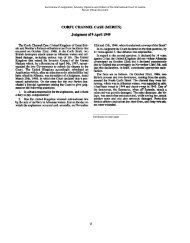botswana/namibia - Cour international de Justice
botswana/namibia - Cour international de Justice
botswana/namibia - Cour international de Justice
You also want an ePaper? Increase the reach of your titles
YUMPU automatically turns print PDFs into web optimized ePapers that Google loves.
and cloudy mo<strong>de</strong> of argumentation adopted by Namibia. Even within the corners of the key<br />
propositions advanced by Namibia there are substantial inconsistencies. Thus, the key<br />
propositions quoted above employ three versions of the beginning of the period of alleged<br />
Namibian 'occupation' of the island, as follows:<br />
(i) 'Since 1890' or 'from 1890' (second, sixth and seventh quotations above).<br />
(ii) 'From the beginning of the century' (first quotation above).<br />
(iii) 'From the time of the establishment of the first German station in the Caprivi in 1909' or<br />
'from at least 1909' (fourth and fifth quotations above).<br />
(C) Evi<strong>de</strong>nce Relating to the Period 1890 to 1914<br />
18. According to some of the Namibian assertions quoted above, the subsequent practice or<br />
conduct of the parties relevant to title by prescription in favour of Namibia begins in 1890 at<br />
the time of the conclusion of the Anglo-German Agreement. This is an extravagant scenario.<br />
The German administration of the Caprivi Strip did not begin to <strong>de</strong>velop until after 1909 and,<br />
in<strong>de</strong>ed, this is recognised by the Namibian Government in its Memorial: see pages 29-30,<br />
paras. 77-8; pages 88-93, paras, 222-32. As the Memorial explains:<br />
"Although the Caprivi Strip was allocated to Germany by the Anglo-German Treaty of 1890,<br />
formal administration was not established until 1909". (Namibian Memorial, p.88, para.<br />
222).<br />
19. The Namibian Memorial fails to refer to a single act of jurisdiction on behalf of Germany<br />
relating to Kasikili/Sedudu Island. But the Namibian Memorial seeks to avoid this<br />
consi<strong>de</strong>rable difficulty by the argument that the agricultural activities of the Basubia on the<br />
island were title-generating:<br />
"It was through Chikamatondo and the Masubia tribal organization that German rule of the<br />
Eastern Caprivi was carried out". (Namibian Memorial, p.92, para. 230).<br />
20. This argument is unacceptable for a number of reasons. In the first place, the Namibian<br />
Government invites the <strong>Cour</strong>t to assume that, because the chiefs of the Basubia <strong>de</strong>rived<br />
recognition of their tribal status from the colonial overlord to act in relation to tribal matters,<br />
therefore the chiefs had authority to act as agents of the German State in matters involving<br />
territorial sovereignty. This is a total non-sequitur. No evi<strong>de</strong>nce is offered that such authority<br />
existed either in German colonial law or in the general <strong>international</strong> law of this period.<br />
21. At this point the <strong>Cour</strong>t is requested to consi<strong>de</strong>r the consequences of the Namibian<br />
argument in the context. The context is the conclusion of the Anglo-German Agreement. The<br />
Agreement came into force immediately and the provisions of Article III relating to the Chobe<br />
River sector were self-executing. Would any diplomat or administrator in the contemporary<br />
world have accepted that the partition boundaries were to be alterable by reference to forms of<br />
local legitimacy? The Anglo-German Agreement divi<strong>de</strong>d the traditional territories of the<br />
Basubia. Accordingly, the issue is not one of the rights of the Basubia but whether at the<br />
relevant time the island formed part of German South West Africa or British Bechuanaland.



